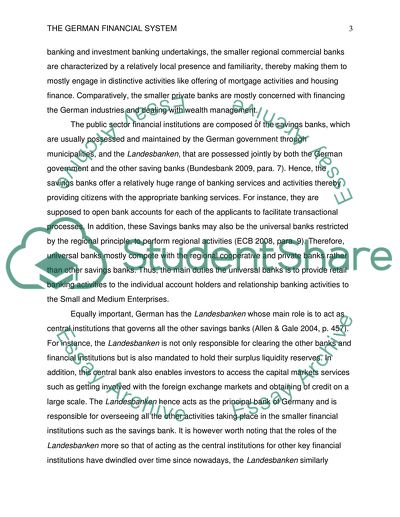Cite this document
(The German Financial System Coursework Example | Topics and Well Written Essays - 2250 words, n.d.)
The German Financial System Coursework Example | Topics and Well Written Essays - 2250 words. Retrieved from https://studentshare.org/politics/1856332-outline-the-main-features-of-the-financial-system-in-a-country-of-your-choice-to-what-extent-do-you-think-that-the-financial-system-needs-to-be-modified-or-reformed-fundamentally-and-why-if-you-favour-modification-or-reform-outline-the-changes-y
The German Financial System Coursework Example | Topics and Well Written Essays - 2250 words. Retrieved from https://studentshare.org/politics/1856332-outline-the-main-features-of-the-financial-system-in-a-country-of-your-choice-to-what-extent-do-you-think-that-the-financial-system-needs-to-be-modified-or-reformed-fundamentally-and-why-if-you-favour-modification-or-reform-outline-the-changes-y
(The German Financial System Coursework Example | Topics and Well Written Essays - 2250 Words)
The German Financial System Coursework Example | Topics and Well Written Essays - 2250 Words. https://studentshare.org/politics/1856332-outline-the-main-features-of-the-financial-system-in-a-country-of-your-choice-to-what-extent-do-you-think-that-the-financial-system-needs-to-be-modified-or-reformed-fundamentally-and-why-if-you-favour-modification-or-reform-outline-the-changes-y.
The German Financial System Coursework Example | Topics and Well Written Essays - 2250 Words. https://studentshare.org/politics/1856332-outline-the-main-features-of-the-financial-system-in-a-country-of-your-choice-to-what-extent-do-you-think-that-the-financial-system-needs-to-be-modified-or-reformed-fundamentally-and-why-if-you-favour-modification-or-reform-outline-the-changes-y.
“The German Financial System Coursework Example | Topics and Well Written Essays - 2250 Words”, n.d. https://studentshare.org/politics/1856332-outline-the-main-features-of-the-financial-system-in-a-country-of-your-choice-to-what-extent-do-you-think-that-the-financial-system-needs-to-be-modified-or-reformed-fundamentally-and-why-if-you-favour-modification-or-reform-outline-the-changes-y.


